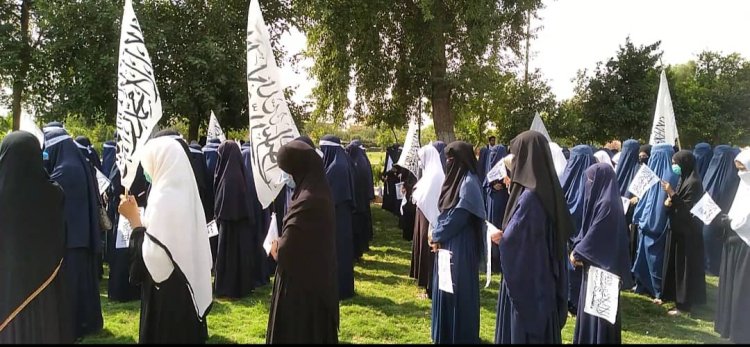The Guardian: Taliban Condition Family Aid on Girls Attending Madrasas

Since the Taliban’s return to power in August 2021, the education of millions of Afghan girls and women has been severely restricted. With secondary schools and universities closed, madrasas have become the only educational option for girls.
The Guardian and Zan Times reported in an investigation across eight provinces that families are under pressure to enroll their daughters in madrasas. Those who resist face food shortages, job restrictions, and social isolation. Some families are forced to send their daughters to these schools to receive a small monthly aid of 11 euros.
A mother named Nasreen told The Guardian: “They told us to send our daughters to their religious classes, or we would receive nothing.”
In the report, Nahid, a 24-year-old economics student in Herat, explained that she spends her mornings in an underground madrasa with about 50 other women and girls, all wearing black, memorizing the Quran and receiving religious instruction. She said she knows the Taliban aim to change women’s minds, but “if I stay at home, I’ll go crazy. If I go, at least I see other women.”
Reports also indicate that attending madrasas changes girls’ behavior and outlook. Families have observed that girls return home stricter, more critical, and sometimes even calling their parents “infidels.”
According to the reports, the curriculum in madrasas is limited to Quran memorization, interpretation of Islamic law by the Taliban, gender roles, and rules of dress and behavior. Subjects like mathematics or science are not taught. Textbooks are mostly imported from Pakistan in Pashto, making it difficult for children in Persian-speaking regions to understand the material.
Since the Taliban’s return, the number of madrasas across provinces has increased. According to the Taliban’s Ministry of Education, by the end of last year there were more than 21,000 madrasas in Afghanistan, and between September 2024 and February 2025, around 50 new schools were established in 11 provinces.
Madrasas are run by mullahs, and their salaries are paid by the Ministry of Education under Taliban rule. To supply teaching staff, the Ministry has issued teaching certificates to 21,300 former madrasa students, allowing them to teach in schools and universities.
A school director in Farah province told The Guardian that he was instructed to fire five qualified teachers; one of the replacements could not even read but was chosen due to his madrasa certificate and connections with Taliban officials.
The Guardian also cited activists saying that even international aid is diverted to support madrasas. In one case, school supplies donated by UNICEF to a public school were transferred to a mullah’s class, with the school custodian ordered to mark them as “lost.”
The Guardian and Zan Times concluded that the Taliban’s educational policies are placing a new generation of Afghan girls under a restricted and controlled ideology, limiting not only scientific and higher education but also social norms and women’s employment opportunities.
